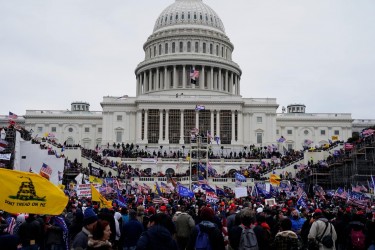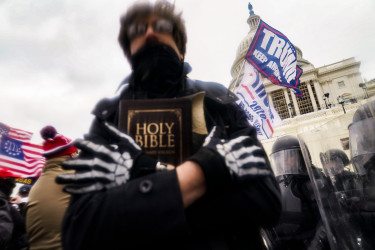The invasion of the U.S. Capitol building Wednesday was shocking in many respects, as was the continued determination of some members of Congress to obstruct the certification of President-elect Joe Biden’s victory in the wake of these violent actions. Now the question is: How should the federal government respond? It is clear the current administration will do nothing; Congress abdicated all responsibility for reaction and declared a recess. When Biden takes office on Jan. 20, he and his administration will be tasked with responding. And when they do, they should look not to 1876, as many politicians and commentators have been arguing, but to 1871.
That year, Congress and President Ulysses S. Grant initiated a campaign to punish members of the Ku Klux Klan. This terrorist organization, founded in 1868 in Tennessee in defense of white supremacy, had spread across the South in a matter of months. Klan members convened at night, donned disguises and rode through the countryside beating, whipping, raping and killing Black (and some White) Southerners who dared claim their rights provided by the 13th, 14th and 15th amendments in the aftermath of the Civil War.
In response to this escalating violence, Congress passed the first Enforcement Act in May 1870. This legislation reasserted the rights of male citizens to vote and made it illegal to “hinder, delay, prevent, or obstruct” those rights by “force, bribery, threats, intimidation, or other unlawful means.” It also explicitly outlawed the tactics of the Ku Klux Klan, deeming it a felony for two or more people to conspire together “or go in disguise upon the public highway” to violate the rights of their fellow citizens.
And yet, violent assaults on Black and White Republican voters only escalated, reaching a peak before and after the midterm elections. As a result, the next year, Congress passed two additional enforcement acts. These enabled the federal government to exert pressure on states denying their citizens equal protection and voting rights. The third act brought Klan violence under federal jurisdiction, and allowed Grant to declare that actions that sought to overthrow or defy federal authority constituted a “rebellion against the government of the United States.” To suppress this rebellion, the president could lawfully suspend the privileges of the writ of habeas corpus, allowing military authorities to arrest Klan members immediately.
Congress also formed a joint committee to investigate the Klan’s actions in the South. It held hearings, and in the summer of 1871, sent bipartisan subcommittees to cities to take the testimony of Black and White Republican voters whom the Klan had attacked. In South Carolina, witnesses and spectators crowded into the hallways and meeting rooms where the subcommittee met, bearing witness to the bravery of Klan victims who appeared to tell their stories. As the historian Kidada E. Williams has argued, these witnesses made “bold decisions to risk their lives and their credibility and to recover their agency and resist violence by proclaiming their trauma to strangers.” In so doing, they laid the groundwork for the Southern Black community’s continued mobilization against White supremacy after 1871.
As the joint committee prepared to publish its report and thousands of pages of victim testimony, Grant’s attorney general, Amos Akerman, planned for prosecution.
Akerman had been appointed to his post in the summer of 1870 and placed at the head of the recently established Justice Department. A resident of Georgia, he was the only Southerner in Grant’s Cabinet, and the only former Confederate officer.
Ackerman knew his fellow White Southerners well: “Nothing is more idle than to attempt to conciliate by kindness that portion of the Southern people who are still malcontent,” he said. “They take all kindness of the part of the government as evidence of timidity, and hence are emboldened to lawlessness by it. It appears impossible for the government to win their affection. But it can command their respect by the exercise of its powers.”
The best course of action, Akerman argued to Grant, was to choose one state as a target for arrests and prosecutions to serve as an example of the federal government’s dedication to defending civil rights. After determining that enough evidence of Klan violence in South Carolina existed to begin the process, he notified the president. In October 1871, enabled by the third enforcement act, Grant declared that the most violent of South Carolina’s counties were in a state of insurrection and suspended the writ. Military forces fanned out across the countryside, arresting suspected Klan members and jailing them.
During the South Carolina KKK trials, which began in November 1871 in Columbia, federal attorneys successfully prosecuted hundreds of Klan members for conspiracy to deprive citizens of their voting rights. Newspapers across the country covered the trials, often publishing the testimony and legal arguments verbatim. In 1872, the federal government published complete transcripts of the trials for distribution to members of Congress and the public.
“The entire country is watching with unusual interest and anxiety,” one of the federal attorneys declared. “This trial and its results stretch far beyond the interests of every citizen, and go down to the very foundations of our American liberty and government.”
The actions that the federal government took in 1871 signaled its willingness to defend the constitutional rights of the nation’s citizens, Black and White, and to protect them against violence. The combined efforts of Congress, Grant and Akerman and his team of federal attorneys drove the KKK underground for several years.
The effects of these actions were, unfortunately, only temporary. Congress grew tired of focusing on Southern violence, and by 1874, the Justice Department ceased its prosecutions of Klan members. As Akerman (whom Grant fired in December 1871) told a friend, Black Southerners should no longer look to the federal government for aid. “The Northern mind, being full of what is called progress,” he observed, “runs away from the past.”
This federal abandonment of the defense of civil rights is one of the great horrors and tragedies of our nation’s history. But the events of 1871 provide essential historical lessons for the Biden administration and our legislators today.
First, there is precedent for holding those who participated in the attack on the Capitol, and those who aided and abetted it, legally responsible.
Second, this is not just a judicial matter, it is a political one, too. Investigations, arrests and prosecutions signal that such actions are unacceptable in our democracy. And that is why widely publicizing the details of these transgressions matters as well.
Finally, as Akerman understood in 1871, conciliation is not an option. Biden has signaled that his administration is willing to take action. On Thursday, in his introduction of Merrick Garland as his nominee for attorney general, Biden noted the role the Justice Department played in prosecuting the KKK and argued that “this original spirit must again guide and animate its work.”
This commitment to racial justice is vital. For the silence and inaction of our political leaders will only embolden the white-supremacist mob, undermine democracy and endanger those who have fought hardest to secure freedom for themselves — and for all Americans.
























